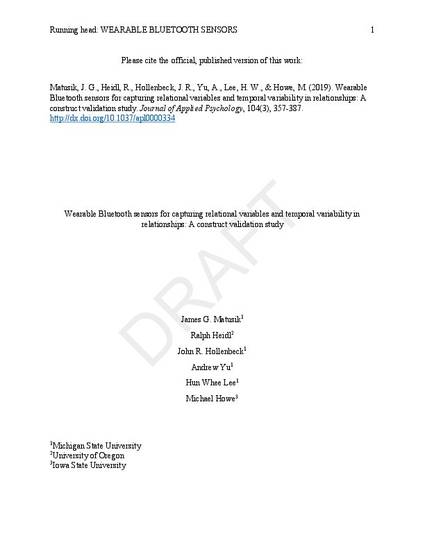
The advent of wearable sensor technologies has the potential to transform organizational research by offering the unprecedented opportunity to collect continuous, objective, highly granular data over extended time periods. Recent evidence has demonstrated the potential utility of Bluetooth-enabled sensors, specifically, in identifying emergent networks via colocation signals in highly controlled contexts with known distances and groups. Although there is proof of concept that wearable Bluetooth sensors may be able to contribute to organizational research in highly controlled contexts, to date there has been no explicit psychometric construct validation effort dedicated to these sensors in field settings. Thus, the two studies described here represent the first attempt to formally evaluate longitudinalBluetooth data streams generated in field settings, testing their ability to (a) show convergent validity with respect to traditional self-reports of relational data; (b) display discriminant validitywith respect to qualitative differences in the nature of alternative relationships (i.e., advice vs. friendship); (c) document predictive validity with respect to performance; (d) decompose variance in network-related measures into meaningful within- and between-unit variability over time; and (e) complement retrospective self-reports of time spent with different groups where there is a “ground truth” criterion. Our results provide insights into the validity of Bluetooth signals with respect to capturing variables traditionally studied in organizational science and highlight how the continuous data collection capabilities made possible by wearable sensors can advance research far beyond that of the static perspectives imposed by traditional data collection strategies.
Available at: http://works.bepress.com/michael-howe/11/

This article is published as Matusik, J. G., Heidl, R., Hollenbeck, J. R., Yu, A., Lee, H. W., & Howe, M. (2019). Wearable bluetooth sensors for capturing relational variables and temporal variability in relationships: A construct validation study. Journal of Applied Psychology, 104(3), 357-387. Doi: 10.1037/apl0000334. Posted with permission.